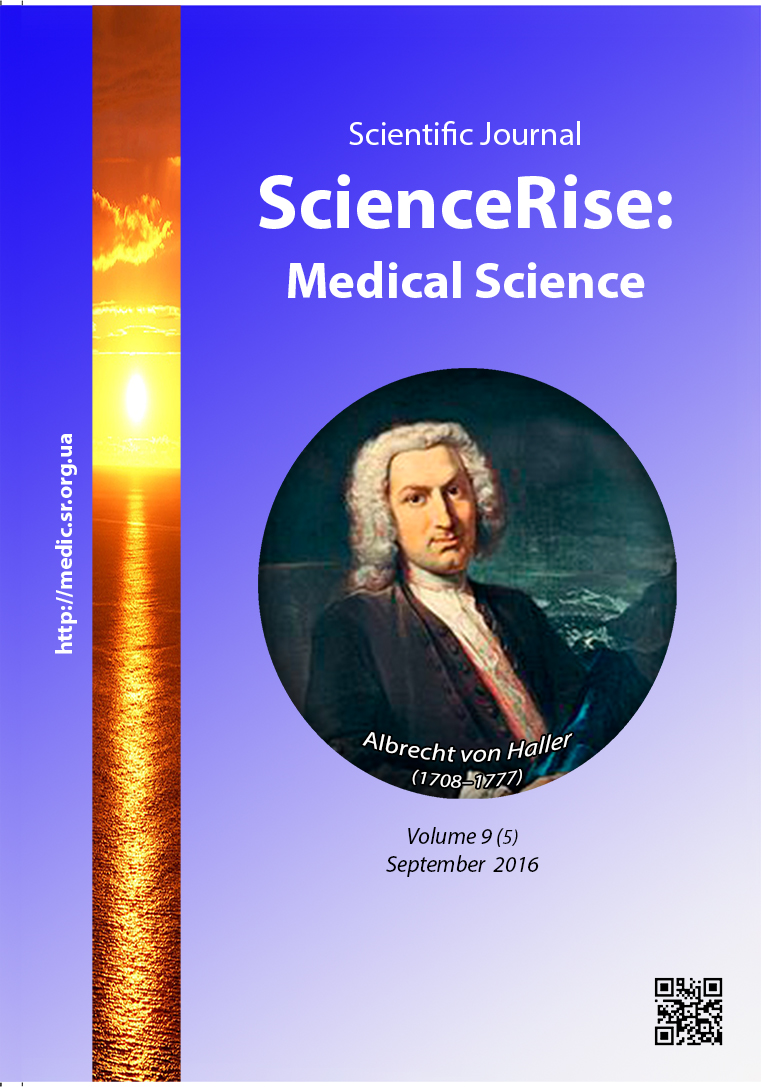Analysis of the features of affective and neurotic psychopathological symptoms in cosmetological patients
DOI:
https://doi.org/10.15587/2519-4798.2016.77789Keywords:
psychopathological symptoms, medical cosmetology, psychic distress, medical-psychological help, clinical psychologyAbstract
The significant prevalence of psychic pathology among patients of the medical sphere, including medical cosmetology puts a question about organization of medical-psychological help for this category of patients/clients.
Aim of research – to reveal the features of the structure of affective-neurotic psychopathological symptoms in cosmetological patients.
Contingent and methods of research. The testing included 286 women, who asked for cosmetological help. The interrogated were divided in three groups on the base of self-relation criterion: 1 group included persons with disharmonious type with tendency to the understated self-appraisal (G1, n=108), 2 group – with harmonious type (G2, n=96) and 3 group – with disharmonious type with inclination to the overstated self-appraisal (G3, n=82). Determination of the intensity of psychopathological symptoms was carried out by the SCL-90-R method.
Results. The main manifestations of affective-neurotic symptoms in women with disharmonious type of self-relation with inclination to understated self-appraisal were somatization on astheno-neurotic type, the expressed anxiety component (worry, strain, fear, waiting for troubles, excessive bother), indecisiveness, need to verify the own actions, intrusive ideas, lack of forces, hypothymia, self-accusation, feeling of necessity of excessive efforts for own activity, discomfort in populous places; in patients with inclination to overstated self-appraisal – somatization with illogical and hysteroid manifestations, strain, nervousness, excessive bother, intrusive ideas, feeling of loneliness, depression. In women with harmonious self-relation somatization was manifested mainly by cephalalgias, strain, less nervousness, intrusive ideas, the necessity to verify the own actions and hypothymia. The structure of psychopathological symptoms in cosmetological patients reflected the meaningful features and directionality of psychic reaction to stress.
Conclusions. The women, who ask for the medical care, form the group, heterogenic by psychological characteristics that must be taken into account at giving medical and psychological help. The patients with disharmonious type of self-relation, especially the ones with inclination to understated self-appraisal, form the risk group as to the psychic health and need medical-psychological helpReferences
- Beketova, N. (2014). Cosmetic procedures in dermatological practice: point of view of practitioner in psychodermatology. Cosmetics and medicine, 4, 74–81.
- Bewley, A., Affleck, A., Bundy, C., Higgins, E., McBride, S. (2013). Psychodermatology services guidance: the report of the British Association of Dermatologists' Psychodermatology Working Party. British Journal of Dermatology, 168 (6), 1149–1150. doi: 10.1111/bjd.12330
- Aleksandrov, A. A., Bagnenko, E. S. (2012). Psychological characteristics of women with cosmetic defects of the facial skin. Herald of psychotherapy, 41 (46), 52–66.
- Bodnar, L. A. (2011). Clinical-psychopathological and pathopsychological characteristics of patients who turned to plastic surgeons for rhinoplasty. Mental Health, 1-2 (30-31), 4–7.
- Petrova, N. N., Gribova, O. M. (2014). Dysmorphophobia in clinic of aesthetic surgery. Mental disorders in general medicine, 1, 26–30.
- Moroz, S. M., Yavorskaya, I. (2015). Dysmorphophobia and Dismorphomania: mirrors cheating. Cosmetologist, 6 (74), 108–110.
- Slastenina, V. V. (2007). Socio-psychological characteristics of women resorting to the services of plastic surgery. Bulletin of the Tomsk State University, 303, 205–208.
- Shakurov, I. G., Glubokova, I. B., Tabashnikova, A. I. (2009). Psycho-emotional status and personality characterological features of patients with scar skin changes. Bulletin of dermatology and Venerology, 3, 50–60.
- Sats, E. A., Slobodchikov, I. M. (2015). Features of consciousness of women as clients of cosmetic services. Modern problems of science and education, 1-1. doi: 10.17513/spno.121-18589
- Sharma, P., Sreejayan, K., Ghosh, S., Behere, R. (2013). Psychiatric evaluation in dermatology: An overview. Indian Journal of Dermatology, 58 (1), 39. doi: 10.4103/0019-5154.105286
- Filaković, P., Petek, A., Koić, O. et. al. (2009). Comorbidity of depressive and dermatologic disorders – therapeutic aspects. Psychiatr. Danub., 21 (3), 401–410.
- Conrado, L. A., Hounie, A. G., Diniz, J. B., Fossaluza, V., Torres, A. R., Miguel, E. C., Rivitti, E. A. (2010). Body dysmorphic disorder among dermatologic patients: Prevalence and clinical features. Journal of the American Academy of Dermatology, 63 (2), 235–243. doi: 10.1016/j.jaad.2009.09.017
- Andrushchenko, A. V. (2011). Psychicheskie I psychosomaticheskie rasstroystva v ucherezhdeniyah obschesomaticheskoi seti (kliniko-epidemiologicheskie aspekti, psychosomaticheskie otnoshenia, terapia) [Mental and psychosomatic disorders in somatic network institution (epidemiological aspects, psychosomatic relationship, therapy)]. Moscow, 363.
- Tarabrina, N. V. (2001). Psychology of post-traumatic stress. Sankt-Peterburg: Peter, 272.
Downloads
Published
How to Cite
Issue
Section
License
Copyright (c) 2016 Михайло Анатолійович Юдін

This work is licensed under a Creative Commons Attribution 4.0 International License.
Our journal abides by the Creative Commons CC BY copyright rights and permissions for open access journals.
Authors, who are published in this journal, agree to the following conditions:
1. The authors reserve the right to authorship of the work and pass the first publication right of this work to the journal under the terms of a Creative Commons CC BY, which allows others to freely distribute the published research with the obligatory reference to the authors of the original work and the first publication of the work in this journal.
2. The authors have the right to conclude separate supplement agreements that relate to non-exclusive work distribution in the form in which it has been published by the journal (for example, to upload the work to the online storage of the journal or publish it as part of a monograph), provided that the reference to the first publication of the work in this journal is included.









